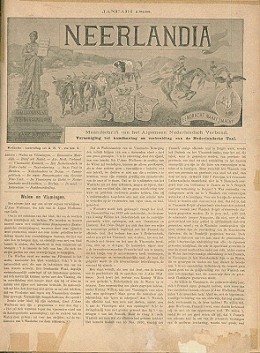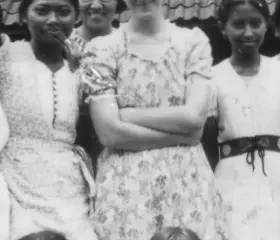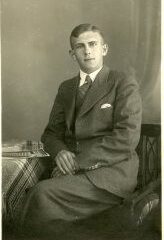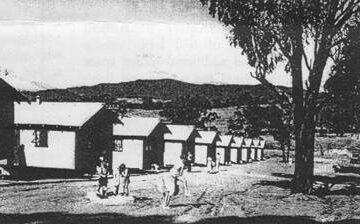Anna Siebenhaar, the older sister of Willem Siebenhaar, followed his brother from the Netherlands to Perth, Australia in the 1890s.
In 1896 at the age of 42 she married Edgar Semmens at Coolgardie

In 1908, Anna was appointed the Australasian representative of the ‘Het Algemeen Nederlandsch Verbond’ (the ANV or General Dutch League/ Union) in succession to the secretary to the Dutch Consulate in Melbourne’.
The ANV had been founded in 1895 as a literary society with the object of promoting cooperation in the fields of Dutch language and culture, fostering kinship ties as well as trade and commerce between the NL and Dutch residents in its colonies and foreign lands.
Like her brother, Anna Semmens Siebenhaar (the appellation she sometimes used), was talented and outspoken, as letters published in the newspapers and surviving in the West Australian archives testify.
Anna censored for anti-British behaviour
Anna had come to the attention of the Censorship Office of Military Intelligence in Perth, and the above is contained in two of a number of Anna’s letters to the Netherlands that had been intercepted and translated between 1915 and 1919. The Censor notes that Anna was said to be on very bad terms with her husband Edgar. The military intelligence authorities also noted that; ‘She has been regarded as anti-British in her sympathies, and throughout the war her correspondence has been reported to the Censor as being of a disaffected character. Anna had organised a number of meetings of the ANV at her home. It was stated that Mr Semmens didn’t agree with these meetings, especially in relation to the meeting with the deserters of a Dutch Naval Squadron visiting Fremantle in 1910.
As early as February 1915, Anna had come under observation when she had sent a letter on behalf of ‘Het Algemeen Nederlandsch Verbond’ (ANV or General Dutch Union) to the editor of the Dutch monthly paper Neerlandia in Dordrecht with the 1914 annual report on the local branch of the ‘union’87. Anna’s report states that in the early part of 1914:
interviewing officer scrawled a handwritten note on the file:
`Mrs Semmens’ object for these meetings perhaps is, to engender her anti-British propensities into the minds of a handful of deserters from the Dutch Warships and a few others. For about 15 years, we have known this lady to be very headstrong and anti-British but all of the time she loses sight of the fact that both her husband and herself are Civil Servants as Registrars of Births Deaths and Marriages…’
In December 1918, the local military intelligence considered that the language used by Anna in her letters constituted a breach of Regulation 27A (a) of the War Precautions Regulations and conveyed this to the Commonwealth Secretary of Defence in Melbourne ‘as her hostile statements may receive a certain amount of damaging publicity’ in Holland.
In January 1919 the Minister for Defence’s decision was conveyed to the Commandant of the 5th Military District in Perth: ‘As the publication of such letters in a neutral country might tend to discredit Britain, I authorise the District Commandant to prosecute, if after consultation with the representative of the Crown Solicitor, he is satisfied that a case would succeed’. The District Commandant sought a legal opinion, forwarding the file of letters to solicitors Moss, Dwyer, Unmack & Thomas. The solicitors’ view was that Anna had committed a breach of Regulation 27A in a letter dated 1 December 1918 to Felix Cohen in Rotterdam, in which she had said words calculated to incite hostility to the British Empire, although the legal advisers had some doubt as to the meaning of the words ‘calculated to incite hostility’ contained in Regulation 27A (Anna’s letter to Cohen expressed pro-German and anti-English sentiments). The preparation of the prosecution case was commenced. On 5 February 1919 a letter was sent to Anna from the Intelligence Section asking her to call at the Military District headquarters in Perth.
The interviewing officer scrawled a handwritten note on the file:
Mrs Semmens is at feud with the wife of her brother — Lydia Bruce Siebenhaar, who is the author of anti-German letters in the press. Apparently, a good deal of Mrs Semmens’ disaffection is caused by the hate and detestation of her sister in law. Mrs Semmens strikes me as half-crazy on the subject of her sister-in-law & Holland and I do not consider that prosecution of her would lead to a very good result.
That appears to have been the end of the matter.
Anna returned to the Netherlands, possibly in 1922, and died at Voorburg in 1938 This is an abstract from an article in the book ‘A Touch of Dutch’ by Neil Foley


